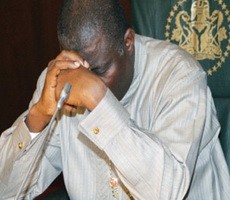| | International 
[ 2012-01-09 ] 

Nigerian President Goodluck Jonathan
Nigeria president fears Boko Haram has 'ties' in his government
Nigeria's president has said for the first time he
thinks sympathisers of the Islamist Boko Haram
group are in his government and security
agencies.
Goodluck Jonathan's comments come amid a wave of
violence blamed on Boko Haram which has left
dozens of people dead in the north, most of them
Christians.
Mr Jonathan also said the security situation was
now more complex than during the civil war four
decades ago.
More than one million people died in the 1967-1970
conflict.
More than 80 people have been killed in recent
weeks in attacks apparently carried out by Boko
Haram, adding to the more than 500 killed in the
past year.
A 24-hour wave of violence apparently targeting
Christian communities at the end of last week led
to hundreds of people fleeing parts of
north-eastern Nigeria.
Boko Haram, whose name means 'Western education is
forbidden', is fighting to overthrow the
government and create an Islamic state.
One of its factions has warned southerners, who
are mostly Christian and animist, to leave the
mainly Muslim north of Nigeria.
A senior Christian cleric has warned that the
country is sliding towards civil war.
Curfew
Mr Jonathan, a Christian, was attending a
Remembrance Day church service in the capital,
Abuja, when he spoke about Nigeria's worsening
security situation.
Of the Boko Haram sympathisers, he said "some of
them are in the executive arm of government, some
of them are in the parliamentary/legislative arm
of government, while some of them are even in the
judiciary".
"Some are also in the armed forces, the police and
other security agencies."
The situation was, he said, "even worse than the
civil war that we fought".
"During the civil war, we knew and we could even
predict where the enemy was coming from... But the
challenge we have today is more complicated," Mr
Jonathan said.
"Somebody said that the situation is [so] bad that
even if one's son is a member, one will not even
know. That means that if the person will plant a
bomb behind your house, you won't know."
Boko Haram has staged numerous attacks in northern
and central areas in recent months - on Christmas
Day it attacked a church near Abuja, killing
dozens of people.
Last week the president declared a state of
emergency in Yobe and Borno states, as well as
Plateau state in central Nigeria and Niger state
in the west, following a surge in ethnic and
sectarian violence.
Adamawa state, where attacks on Friday left about
30 dead, was placed under curfew and security
forces were deployed.
Christian groups have accused the government of
not doing enough to protect them.
Pastor Ayo Oritsejafor, president of the Christian
Association of Nigeria, said on Saturday that his
members would protect themselves against the
attacks.
"We have the legitimate right to defend ourselves.
We're also saying today that we will do whatever
it takes" he said.
The pattern of the killings suggested "systematic
ethnic and religious cleansing", he added.
Meanwhile, the government also faces the bleak
prospect of a general strike on Monday amid
popular fury over its removal of a fuel subsidy
which has seen fuel prices double for ordinary
Nigerians.
Key facts about Boko Haram
2002: Founded
2009: Hundreds killed when Maiduguri police
stations stormed
2009: Boko Haram leader Mohammed Yusuf captured by
army, handed to police, later found dead
Sep 2010: Freed hundreds of prisoners from
Maiduguri jail
Dec 2010: Bombed Jos, killing 80 people and blamed
for New Year's Eve attack on Abuja barracks
2010-2011: Dozens killed in Maiduguri shootings
May 2011: Bombed several states after president's
inauguration
Jun 2011: Police HQ bombed in Abuja
Aug 2011: UN HQ bombed in Abuja
Nov 2011: Co-ordinated bomb and gun attacks in
Yobe and Borno states
Dec 2011: Multiple bomb attacks on Christmas Day
kill dozens Source - BBC

... go Back | |




